An API is a tool that makes your product more interesting to use.
If you see any new features with the prevailing interfaces, APIs are all to thank for.
APIs can connect data and services to improve the customer experience by making new features available within prevailing interfaces. They make the app more compelling to users.
Fintech APIs make up a large market as they power up financial services.
Let’s get to know about them to understand what they are and how they are transforming the market.
What are Fintech APIs?
Let’s start with the basics.
So, what are Fintech APIs?
In simple words, Fintech APIs are tools that allow financial technology to communicate and share data with financial services and systems.
They work to streamline your experience. Well, as you know, APIs act as a gateway that receives requests, processes them, and delivers the necessary information to the recipient.
For example, when a user connects a personal finance app to their bank accounts via an API, the app sends a request to the bank’s system.
The bank API then confirms the request and sends out an authentication request. This is how the API works.
If you are looking for the best Fintech APIs, then you’re in luck as the market is filled with them including Plaid, Stripe, PayPal, Coinbase API, & more.
We will talk about that later, but first:
Importance of API in Fintech System
Integrating FinTech APIs while creating an app is becoming the new norm.
There are several fintech solutions and banking apps that are leveraging the fintech APIs for their daily operations.
But, what importance does it possess in the Fintech System? Let’s get to know about it below:
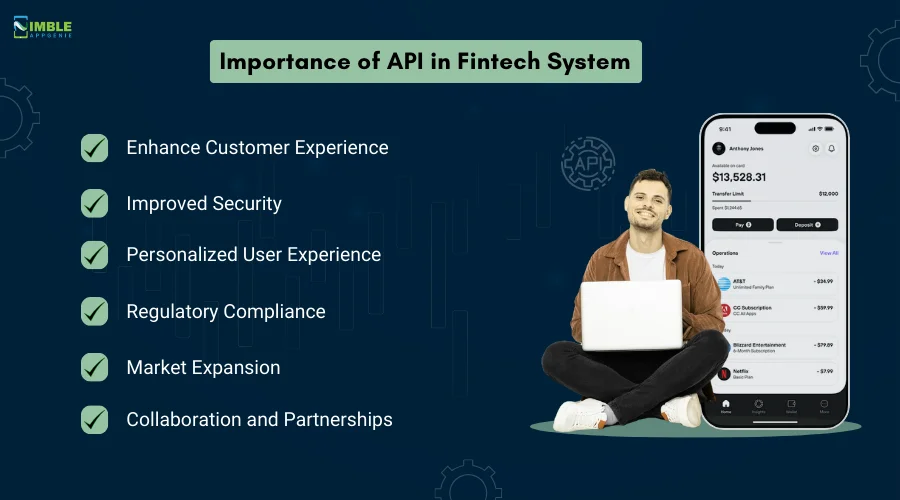
♦ Enhance Customer Experience
First of all, APIs allow fintech companies to access and analyze customer data. With that, you get to create a more personalized experience for your users.
In addition, these tools make it easier for users to take control of their finances across different channels, leading to better customer loyalty and experience.
♦ Improved Security
Where money is involved, security becomes a top concern.
Well, the good news is APIs can help with security in Fintech Systems in different ways that include regulatory and compliance requirements of their target market.
APIs can address validation errors, server failures, and even incorrect requests, which is how they protect the sensitive financial data of users.
♦ Personalized User Experience
Fintech APIs enable the collection and analysis of vast amounts of financial data.
This can be used to tailor services to individual user preferences and needs. This personalization enhances customer satisfaction and loyalty, driving business growth.
♦ Regulatory Compliance
Navigating the complex regulatory environment of the financial industry is a major challenge.
Fintech APIs often come equipped with built-in compliance measures that conform to industry standards such as GDPR, PCI DSS, and more.
This helps fintech companies ensure that they are not only providing innovative services but also adhering to the necessary legal frameworks.
♦ Market Expansion
APIs in fintech allow companies to expand their services across different geographical markets without significant barriers.
They enable easy adaptation to local financial systems and regulations, helping businesses scale internationally with less friction.
♦ Collaboration and Partnerships
If you want to be successful among consumers, collaboration is important.
The use of APIs in fintech fosters collaboration between fintech startups, traditional banks, and tech companies.
These partnerships create a more integrated financial services landscape, where companies can leverage each other’s strengths to deliver comprehensive solutions to users.
By harnessing the power of APIs in fintech, companies are not only enhancing their operational capabilities but are also driving the financial sector towards a more innovative and user-focused future. This is why APIs have become foundational in the development and expansion of fintech solutions globally.
Use Cases of Fintech APIs
As we have said before, Fintech APIs are changing the way financial services are launched and managed.
By harnessing these APIs, companies can do a lot of things including improve their user experience, and introduce innovative solutions.
However, there are many key use cases that the best part of the adaptability and importance of APIs in Fintech:
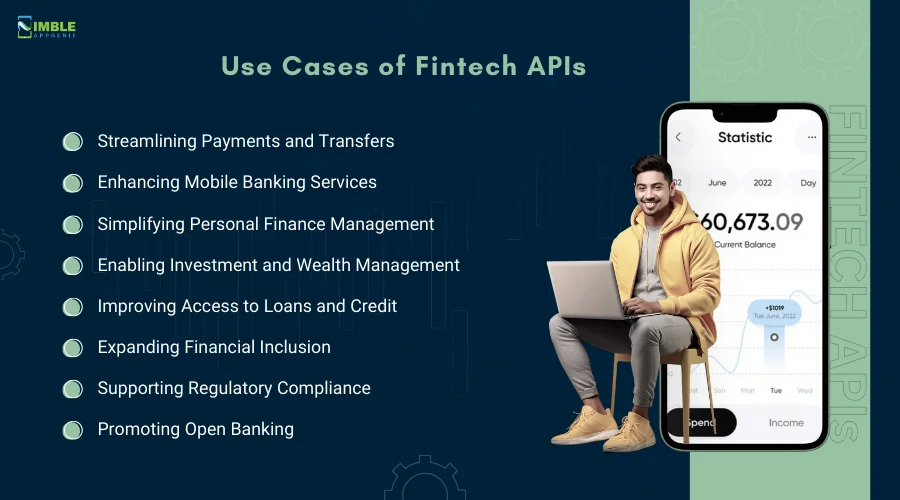
1. Streamlining Payments and Transfers
In case, if you are looking forward to creating an app like Cash, then you must be wondering how to make it possible.
Well, the answer is Fintech APIs.
Payment APIs streamline the process of inflow and outflow of money.
They allow businesses to incorporate payment processing capabilities into their platforms, enhancing smoother transactions without the requirement for external payment gateways.
This use case is important for peer-to-peer payment apps and online service providers.
2. Enhancing Mobile Banking Services
Banking APIs allow financial institutions to provide a huge variety of different banking services. These include depositing checks, paying bills, and more via phone.
This provides more convenience and accessibility, providing them with better control of their finances.
That’s why it’s popular among banking apps.
3. Simplifying Personal Finance Management
By integrating with APIs in expense tracking fintech apps can target users with a broad view of their financial risks, and give customized budgeting advice.
This is possible through safe access to transaction history and bank data, improving financial literacy & helping users make better decisions.
4. Enabling Investment and Wealth Management
Investment APIs are used by Investment and Wealth Management apps to offer services that include automated investing and portfolio management.
Market data and trading platforms can be easily accessed by these APIs, making it easier for users to manage their assets and make better investments.
5. Improving Access to Loans and Credit
Know how to automate the loan approval process; Credit Scoring APIs are of help.
They are mainly used for cash-advance apps and loan lending apps. Usually, they aim to provide lenders with immediate access to an applicant’s credit history, enabling quicker and more accurate credit decisions.
This is somewhere valued for Fintech startups aiming at personal loans & micro-lending.
6. Expanding Financial Inclusion
Fintech APIs aim to streamline financial services to underbanked populations.
put, Fintech Companies can reach a broader audience by facilitating simple and accessible banking services.
So, it improves financial inclusion on a global scale.
7. Supporting Regulatory Compliance
With regulatory and compliance consent, financial institutions can stick to revolving regulations by automating compliance checks and reporting.
This is important for preserving the reliability of financial systems and protecting consumer data. With fintech regulations growing more complex, this is very important.
8. Promoting Open Banking
Open Banking APIs nurture an open and competitive financial services environment.
They allow third-party developers to build innovative financial services and applications that can access bank data.
So, promoting better customer service and personalized financial products.
These use cases illustrate the transformative impact of APIs in fintech, enabling more efficient, secure, and user-friendly financial services that cater to diverse consumer needs and industry demands.
Types of Fintech APIs
There are several Fintech APIs in the market now. If you are looking forward to integrating, you need to know about them. Let’s take a closer look at those Fintech APIs that are making noise in the market.
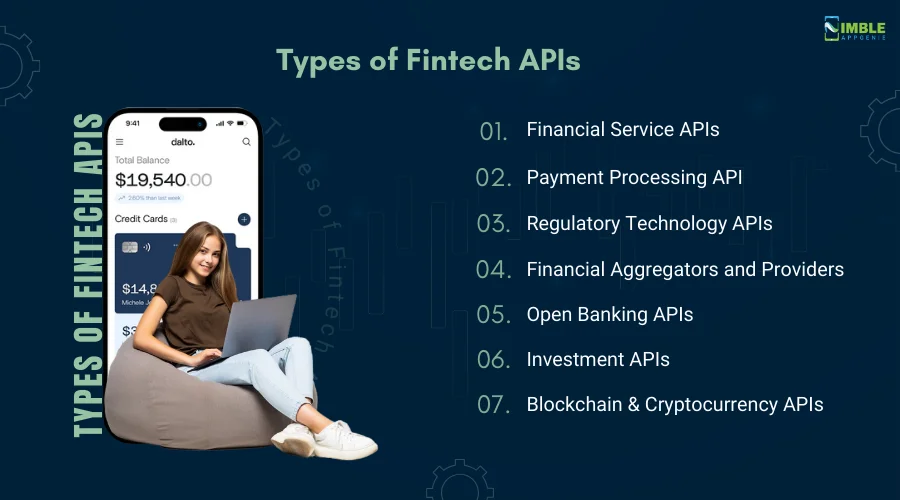
1] Financial Service APIs
A Financial service API is a solution that offers a variety of apps and systems to communicate & exchange data securely.
It enables third-party developers to access and integrate financial information from banks, investment firms, and other institutions. This ultimately provides consumers with more convenient and personalized financial services through various apps and platforms.
2] Payment Processing API
A payment processing API is a set of tools and protocols that allows software applications to communicate with a payment processing system.
This enables them to accept and manage payments within their platform, acting as a bridge between a business’s website and app.
A payment gateway, without the need to build a payment infrastructure from scratch, helps businesses streamline their payment process and integrate payment functionality into their applications.
3] Regulatory Technology APIs
known as RegTech APIs.
These are application programming interfaces that allow different software systems to interact and exchange data.
APIs allow fintech companies to follow regulations and generate compliance reports.
This includes regulatory compliance processes by automating data collection, analysis, and reporting, allowing companies to reduce costs and minimize the risks associated with non-compliance.
4] Financial Aggregators and Providers
Well, one of the most famous types of Fintech APIs is “Financial Aggregators and Providers”.
These APIs allow third-party apps to access financial information, including bank accounts and balances.
Such an API allows users to access their financial data from multiple sources in one place.
5] Open Banking APIs
Open Banking APIs are a part of the Fintech APIs.
It allows users to share financial information with the user’s consent.
These APIs let you access banking services including account information, balance checks, and transaction histories.
They allow third-party developers to create a banking app that offers users insights into their finances without needing to log in to multiple banking portals.
6] Investment APIs
Investment APIs offer feature that includes stock trading, and financial planning. Usually, they are used in robo-advisor platform development, investment app development, and more.
Such APIs aim to provide users with real-time market data, customized investment advice, and automated rebalancing based on individual risk.
7] Blockchain and Cryptocurrency APIs
With the growing demand for digital currencies, these APIs are growing.
They give features that include crypto wallet & blockchain data insights, supporting the growing demand for crypto-related services.
By harnessing the various types of Fintech APIs, investors can develop comprehensive, safe, and user-friendly services that cater to a wide variety of needs.
Challenges in Fintech API Implementation
To start a Fintech Startup, it’s important to know about those hurdles that come in the way.
APIs in Fintech provide different benefits but also come with some challenges that need to be addressed.
After all, knowing them will help businesses mitigate potential issues and ensure secure, reliable, services.
Here are some key challenges we were talking about:
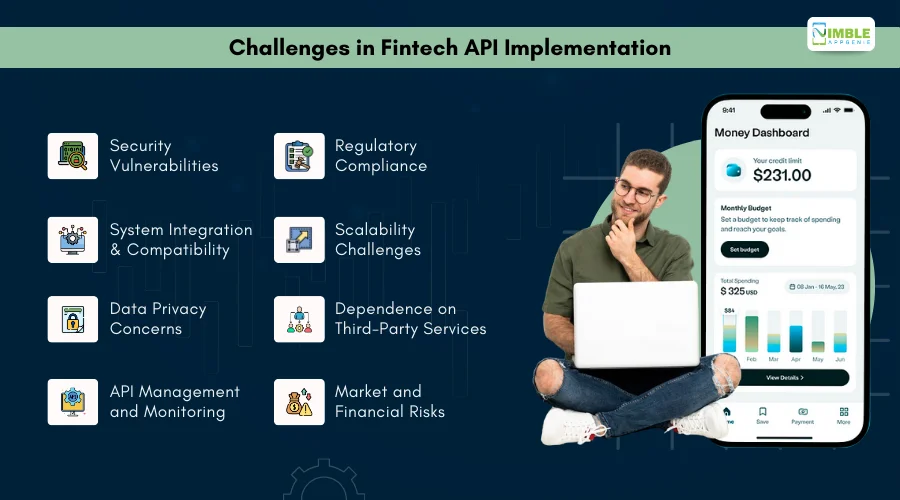
-
Security Vulnerabilities
The open nature of APIs in fintech introduces significant security risks for financial institutions. Vulnerabilities may arise from weak API security measures, such as inadequate authentication or poor data encryption, making these APIs attractive targets for cyberattacks. Such breaches can lead to data loss, financial harm, and a loss of customer trust.
-
Regulatory Compliance
Navigating the complex and evolving regulatory landscape poses a challenge for fintech companies. APIs in this sector must adhere to various financial regulations, including anti-money laundering (AML) laws, the General Data Protection Regulation (GDPR), and Europe’s Payment Services Directive (PSD2). Staying compliant can be difficult, and failing to do so may result in substantial fines and legal repercussions.
-
System Integrations and Compatibility
Integrating APIs into existing financial systems can be problematic, especially with legacy infrastructure that was not designed to support modern API technologies. Compatibility issues may lead to operational inefficiencies, data silos, and disruptions, undermining the seamless user experience that APIs are intended to enable.
-
Scalability Challenges
As financial institutions grow and customer bases expand, the scalability of APIs becomes crucial. During peak transaction times, APIs may struggle with performance bottlenecks or system overload, which can affect service quality and reliability.
-
Data Privacy Concerns
With APIs granting access to vast amounts of sensitive data, ensuring data privacy is a critical issue. Fintech companies must implement robust data protection measures to prevent unauthorized access and comply with privacy regulations.
-
Dependence on Third-Party Services
Many fintech applications rely on third-party APIs for essential features. This dependence can be risky if these third-party services experience downtime, security breaches, or make unexpected changes to their API policies or pricing, disrupting the service.
-
API Management and Monitoring
Ongoing management and monitoring of APIs is vital to ensure they do and are effective. This involves regular updates, patching vulnerabilities, and detecting unusual activity that could signal a security threat.
-
Market and Financial Risks
The rapid pace of technological advancement and fluctuating market conditions can make existing APIs obsolete. Additionally, financial APIs are vulnerable to market risks, such as currency fluctuations, which can affect the functionality of payment systems.
To mitigate these risks, fintech companies must implement strong security protocols, ensure compliance with regulations, actively manage their APIs, and plan strategically for long-term scalability and resilience.
Popular Fintech API Providers
Now, to get to know the concept better, it’s time to look at some top API providers.
They are:
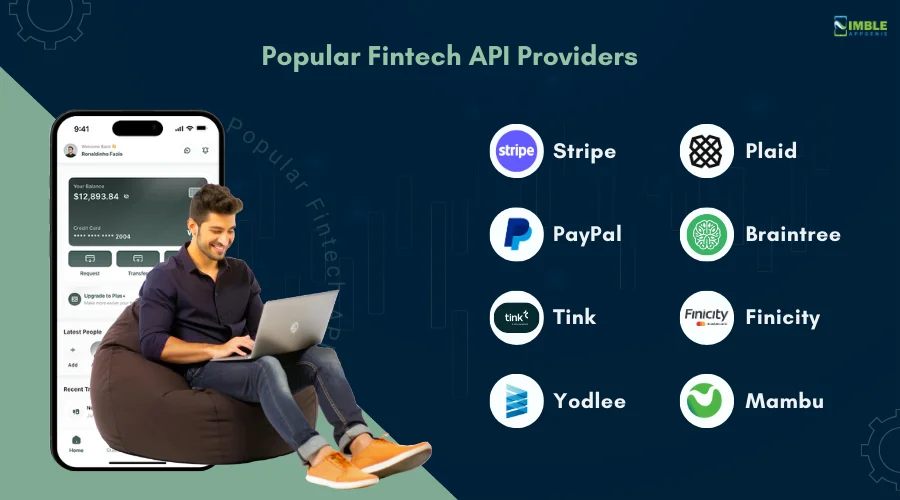
► Stripe
One of the dominating API players in the market is “Stripe”.
Stripe’s API empowers businesses to accept a huge variety of online payments that include credit cards, debit cards, ACH transfers, etc.
It offers features that include invoicing, fraud detection, and managing subscriptions, streamlining the payment experience for both businesses and their customers.
► Plaid
Plaid is a popular Fintech API that acts as a bridge between financial institutions and Fintech apps.
It allows users to seamlessly connect their bank accounts to different financial applications, with supporting features including transaction history access and verifying financial information.
► PayPal
Have you heard of PayPal? PayPal boasts a wide suite of APIs.
Usually, PayPal is a digital payment solution famous for being a top choice for making financial transactions.
The popularity is so strong that investors often Google how to develop an app like PayPal.
Businesses can use these APIs to send invoices, manage subscriptions, & handle issues- all through the same application.
► Braintree
A branch of PayPal, Braintree offers a well-designed API specifically designed for developers to integrate payment functionalities.
Braintree has different features including mobile wallet integration, fraud prevention tools, and safe payment processing.
► Tink
Have you heard of Tink? This pan-European platform focuses on open banking.
It offers access to a huge network of financial institutions, allowing developers to build applications that harness users’ financial data securely.
Tink’s API facilitates features including data aggregation, payment initiation, & personal financial management tools.
► Finicity
Like Plaid, Finicity is a leading API solution enabling account aggregation and data retrieval from different financial institutions.
Finicity API offers different tools for the verification of assets and income, simplifying processes for loan applications & different financial services.
► Yodlee
Yodlee API offers access to financial data from a variety of banks & financial institutions which is why it is one of the prominent players in the account aggregation space.
It offers features such as account balance retrieval, transaction history access, and different categorization of financial data, allowing developers to build strong personal finance management applications and result-oriented fintech solutions.
► Mambu
With Mambu, you get a comprehensive API suite.
Fintech companies and banks can use Mambu’s API to create and launch innovative financial products and services.
It provides various features including account management, loan origination, core banking services, and more, facilitating rapid development & deployment of Fintech solutions.
Nimble AppGenie, Your Partner in Fintech Development
Nimble AppGenie, a top fintech app development company, has recognized itself as a frontrunner in the fintech industry, recognized by Clutch.co, DesignRush, and GoodFirms.
With a 95% retention rate and a portfolio of 350 projects, Nimble AppGenie takes pride in engaging some of the top fintech developers in the field.
Their prominent contribution to platforms like Cut Wallet and SatPay, where they have delivered cutting-edge financial solutions customized to your business needs.
Whether you’re looking to innovate or optimize, Nimble AppGenie offers the expertise and experience necessary to navigate the complex landscape successfully.
Conclusion
Fintech APIs have become the backbone of innovation in financial services.
They have changed how financial businesses and individuals interact with money.
This blog post provides a complete overview of Fintech APIs, exploring their functionalities, benefits, challenges, and the exciting trends shaping their future.
FAQs

Niketan Sharma is the CTO of Nimble AppGenie, a prominent website and mobile app development company in the USA that is delivering excellence with a commitment to boosting business growth & maximizing customer satisfaction. He is a highly motivated individual who helps SMEs and startups grow in this dynamic market with the latest technology and innovation.
Table of Contents






No Comments
Comments are closed.